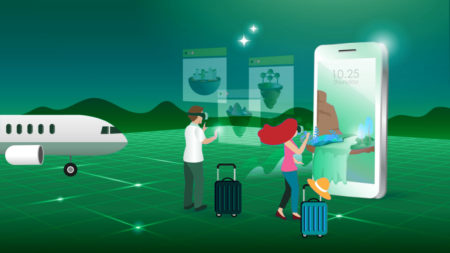Metaverse. Unless you’ve been on a digital detox since mid-2021, you will have come across the term. However, if you’re still struggling to get your head around what the term means, don’t worry. You’re not alone.
Although the word Metaverse has been in circulation for decades—it first surfaced in an obscure, 1992 sci-fi novel—it has reached the public conscious, in no small part because of Facebook’s bold name change. In October 2021, Facebook became Meta. And make no mistake, the change of name wholly represents a change of direction for the company that will now be focussing its efforts on positioning itself as the leading force in the Metaverse.
So, what exactly is the Metaverse, and why is a corporate powerhouse like Meta betting on it. In this article, you’ll learn the answers to both of these questions as we introduce you to the next phase in digital innovation.
What is the Metaverse?
Essentially, the Metaverse is a replica of the physical world in virtual form. It’s a digital space that bridges the two and enables you to virtually carry out the same real-life activities and experiences. The easiest way to perceive it is as the next wave of the internet.
The first wave of the internet laid the foundations, linking various websites and providing search functionality. The second wave made it possible for third-party apps, like Facebook, to function on these foundations. The third wave will enable wide-spread, 3D, immersive online experiences. The Metaverse is a decentralized space that blurs the lines between reality and virtual reality.
Why now?
There are several reasons that metaverse projects have taken off at this point. Of course, Facebook’s headstart has certainly kicked other major organizations into action, but why now? Because of a perfect storm.
As we mentioned above, the term, Metaverse has been around for a long time. Today, the concept can become a reality because:
- Internet access is quicker and easier than ever before
- IoT devices are prevalent
- By 2026, an estimated 7.5 billion people will own a smartphone
- Blockchain technology has matured to enable seamless decentralized payments
- Virtual reality technology is capable of handling many use cases
- The Covid-19 pandemic has normalized a Work From Anywhere (WFA) culture
There may be more, but the primary factors we’ve cited above have provided the perfect foundation for Metaverse technologies.
Why does the Metaverse matter?
When new ideas gain popularity, it’s often said that they will change everything. This isn’t far from the truth when it comes to the Metaverse. The Metaverse has the potential to touch on every area of our lives. It will be everywhere we currently see the internet, and with the growth of IoT technology, this list could grow exponentially. The following areas are some of the most significant that the Metaverse will affect.
Work
Working days will be transformed. Imagine hosting a virtual conference on Mars? It will no longer matter where you are, as you will still benefit from the same experiences as your co-workers. And this new space opens the doors for new forms of collaboration too, with no limit to the number of fellow contributors.
Businesses will provide more meaningful experiences to their employees regardless of where they are located. These connections could lead to closer relationships with staff, despite greater distances.
Entertainment
Many large corporations are investing in the gaming industry. Why? Because video game creators are already one step ahead and in possession of the virtual-world-building tools that will define the creation of the Metaverse. Games like Second Life and Fortnite already enable users to exist as avatars and make real-life purchases in a virtual space.
Moving forward, video games will become increasingly immersive. And it won’t stop there. You will be able to virtually visit an art exhibition, see a play, sit in a movie theatre, or even participate in a show yourself.
Tourism
You’ll no longer have to visit a country physically to experience it. As the Metaverse evolves, users will be able to visit places virtually and experience the sites, sounds, and perhaps one day the tastes and smells of places without leaving their homes.
Culture
With users appearing as avatars, any existing prejudices regarding race, sex, age, or else disappear. This devolution of bias could mean a considerable amount when it comes to leveling the playing field in opportunities for work, education, and social connections.
Retail
Some companies have already started selling products in the Metaverse. And this is a trend that will undoubtedly define the beginning of this period. Recently, Samsung set up a pop-up shop in Decentralland, a vast metaverse space. At the same time, Nike has purchased a virtual shoe company.
Wrap up
The Metaverse is fascinating, and at times, confusing. However, as it grows and develops, you can rely on mymetaverseminute.com to guide you through the fog.
Forget the fluff, stick with us, and together, we’ll discover the benefits, innovations, and even potential pitfalls that this world-changing technology has in store for us all.










